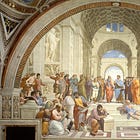1 | DER SATZ : The Leap
Method & Madness | Book I : Existential Fundamentals

My propositions are elucidatory in this way: he who understands me finally recognizes them as senseless.
Originally titled Der Satz1 (The Leap), Wittgenstein’s first publication was a work of provocative 20th-century satire. Disguised as a treatise of profound value, this slim volume (at once somehow both dense and compact) plays out a masterful long-con, dredging its reader through five-dozen pages of immaculate, brain-numbing logic… before finally revealing that the best use of one’s time may have actually been to skip straight to the end and just read the last page. Indeed, the work is so effective that it leaves most scratching their heads, and the rest scrambling to deconstruct and interpret his complex and refined metaphysics… even though he literally says on that very last page that the whole point is that there was no lesson—that it’s time now to throw the ladder away.
The Tractatus2, after all, both opens and closes with the following remark:
“Whereof one cannot speak, thereof one must be silent.”
The rest of the work—each word and every phrase that’s said between the beginning and end—is written just to say this:
If nothing conclusive can be said… then nothing substantive3 can be said.
In other words:
On subjects for which we can have no evidence, we can obtain no useful knowledge.
If, in logic, conclusions are based upon premises, then all substantive theories—when reasoned through to their logical ends—necessarily will reduce back down into some set of empirically-informed premises. Substantive data, after all, is necessary in order to form substantive premises… and such data can’t be considered substantive (unless, of course, you’re either deluded or insane) if it’s drawn from a source which wasn’t, at some point, experiential.4
Wittgenstein says this:
“The right method of philosophy would be … to say nothing except what can be said, i.e. the propositions of natural science, i.e. something that has nothing to do with philosophy: and then always, when someone else wished to say something metaphysical, to demonstrate to him that he had given no meaning to certain signs in his propositions.”
In other words: when someone attempts to qualify a metaphysical theory, that person will always fail—by logical necessity—to “give meaning to some signs”; that is, to offer a complete set of substantive evidence to present a logically-compelling theory.
“Whereof one cannot speak, thereof one must be silent.” And, on the topic of things of which cannot be known, we cannot claim to have knowledge.
This is the lesson in itself—that is, the fact that we didn’t learn anything new about the world through the exercise of performing and analyzing the metaphysics which Wittgenstein constructs in Der Satz (The Leap). In his words:
“The value of this work … consists in the fact that it shows how little has been done when these problems have been solved.”
All that we’ve learned was what we already knew—and that, quite possibly, might truly be…
Everything you’ll ever need to know about philosophy.
Herr Wittgenstein,
You were not my first teacher, nor will you be my last. But, what you’ve given me might possibly be the greatest gift of all—the gift of logic, language, and the wisdom of true science: the ability to know and to understand that all Method is born of Madness.
With great affection,
M. Hise“The Proposition”, in the sense of a logical proposition—also, a German pun which can mean “The Leap”.
Tractatus Logico-Philosophicus, or “Logical-Philosophical Treatise” (in reference to “Tractatus Theologico-Politicus”, or “Theological-Political Treatise”, a debatably-relevant text by Spinoza) was the eventual title given to Wittgenstein’s first publication, at the suggestion of one G.E. Moore—someone who, by all accounts, Wittgenstein didn’t even really like. The publication also prominently features a preface written by one Bertrand Russell, Wittgenstein’s long-time friend and one-time mentor who—at the time of publication—he no longer considered to be intellectually respectable, and saw as fundamentally misunderstanding his work.
i.e. valid, or with substance. A statement or claim which contains knowledge of or conveys information about the world.
Take, for example, the way in which theories are supported within theoretical physics. All theories—even those which might turn out to be wildly incorrect—are informed by axioms, constants, or data which in-turn have been evidenced by empirical observation of the laws of physics. Consider also the way in which theories are evidenced within religious doctrine—that is, by establishing that a miracle has occurred because someone has witnessed (i.e. empirically observed) some kind or other of miraculous happening.











